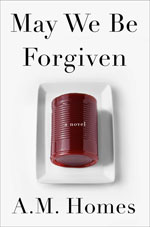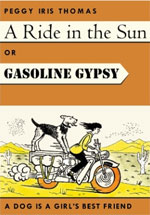
That May We Be Forgiven by A.M. Homes hits the ground hard and running from the opening pages will let you know quickly if you have the intestinal fortitude and heart to continue. The book launches immediately into the first and most visceral of a series of insanely horrible things that happen to a family in less than a year. The sequence of woe is so over the top at times that it seems like a macabre, Tarantinoesque cartoon of violence and perversity. Running parallel to the gutwrenching but – it must be said – often darkly hilarious mayhem, parts of May We Be Forgiven are also lyrically wonderful testaments to spirit, optimism, resilience and forging new family structures out of the ashes of old ones.
For professor, Nixon scholar and nebbish Harold Silver, the old family structure consisted chiefly of his childless marriage with Claire. Rapid-fire tragedy rips asunder the lives of Harry’s brother George, a prominent TV executive, George’s wife Jane and their pre-teen children Nate and Ashley. It falls to profoundly traumatized, reluctant and harried Harry to reconstitute a new and viable life for his niece and nephew. Along the way, he falls sweetly and deeply in love with the children, and learns to appreciate and respect a cast of eccentrics this newly minted family draws to itself along the way.
Homes has a love for her flawed, battered, prickly characters reminiscent of Nicola Barker (whose singular novels I’ve rhapsodized about here and here). Homes also wields bracing social commentary in a fashion reminiscent of Tom Wolfe at his best. At the same time that she’s pointedly criticizing everything from Internet sex to consumer culture to the correctional system, Homes also casts a sympathetic gaze (albeit with a gently skeptical cocked eyebrow) at caring for prematurely overly mature children and aging parents. She poignantly captures the conundrum that nowadays, we seem most “connected” with strangers, and most estranged when we’re with our ostensible loved ones:
“There is a world out there, so new, so random and disassociated that it puts us all in danger. We talk online, we ‘friend’ each other when we don’t know who we are really talking to – we fuck strangers. We mistake almost anything for a relationship, a community of sorts, and yet, when we are with our families, in our communities, we are clueless, we short-circuit and immediately dive back into the digitized version – it is easier, because we can be both our truer selves and our fantasy selves all at once, with each carrying equal weight.”
In an interview in late 2012, Homes explained with fervour what was clearly her aim in May We Be Forgiven, not to mention the riveting journey of Harry and his evolving family and sense of family:
“I want to push back against the pessimism. I can’t bear to accept that everything is basically going to shit. And everything is: the economy, the family, the social structures, the class divide, the political process in this country, global warming, random violence from terrorism. Unless you want to live in denial, I feel that you have to train yourself to find hope. The logical response is to get incredibly depressed, but what’s the point of that? Especially if you’ve got children.”(1)
May We Be Forgiven will rattle and possibly repel the more faint of heart reader. If one can ride out the rollercoaster dips in what feels like a century’s rather than a year’s worth of trauma, it’s well worth it. Even at its most horrific, May We Be Forgiven is satisfyingly redemptive as well as an irresistible read.
Notes:
1. AM Homes on her new novel May We Be Forgiven
The acclaimed novelist AM Homes talks about her latest dark satire of 21st-century America
by Richard Grant, The Telegraph
See also:
May We Be Forgiven by A.M. Homes – review
by Harvey Freedenberg in Bookreporter.com



